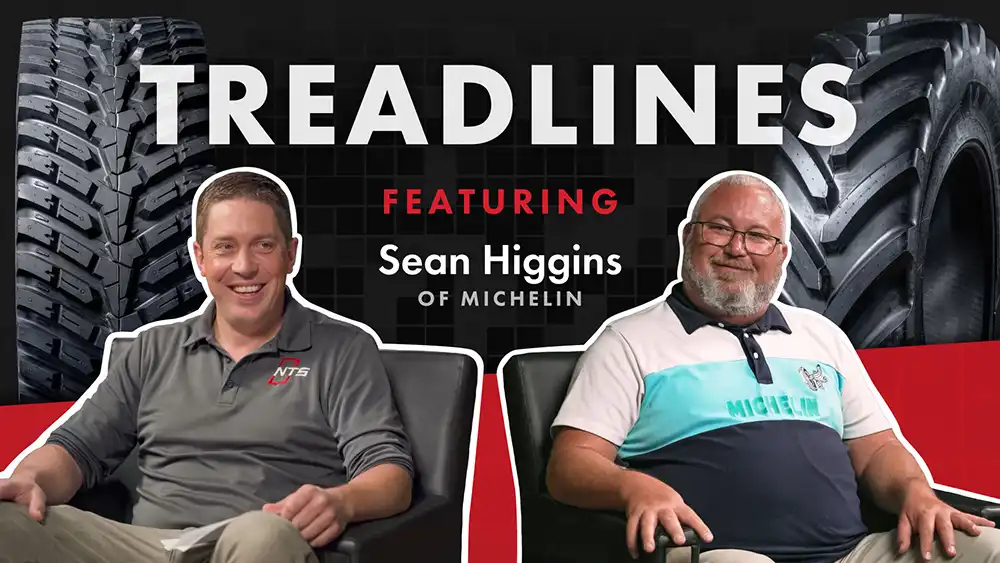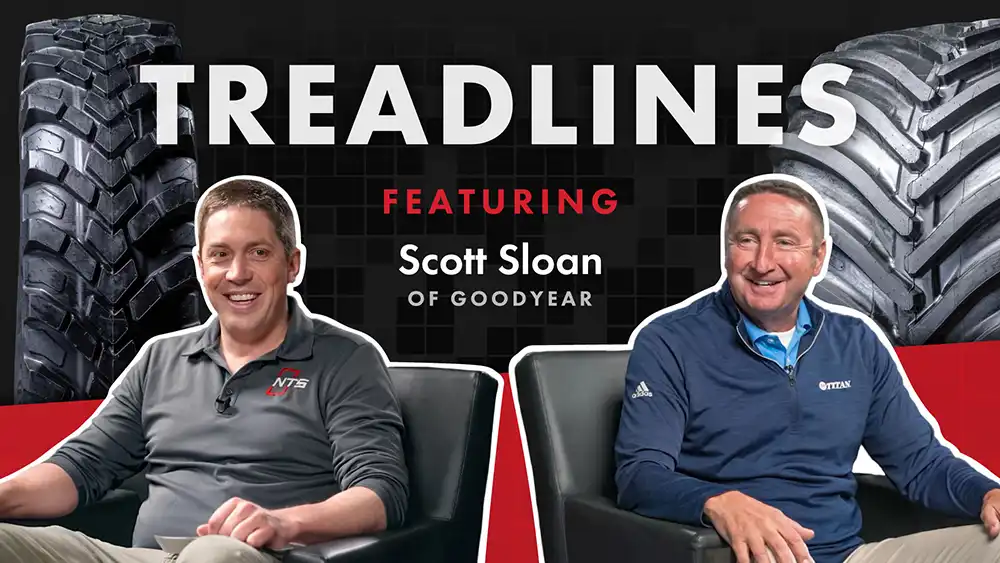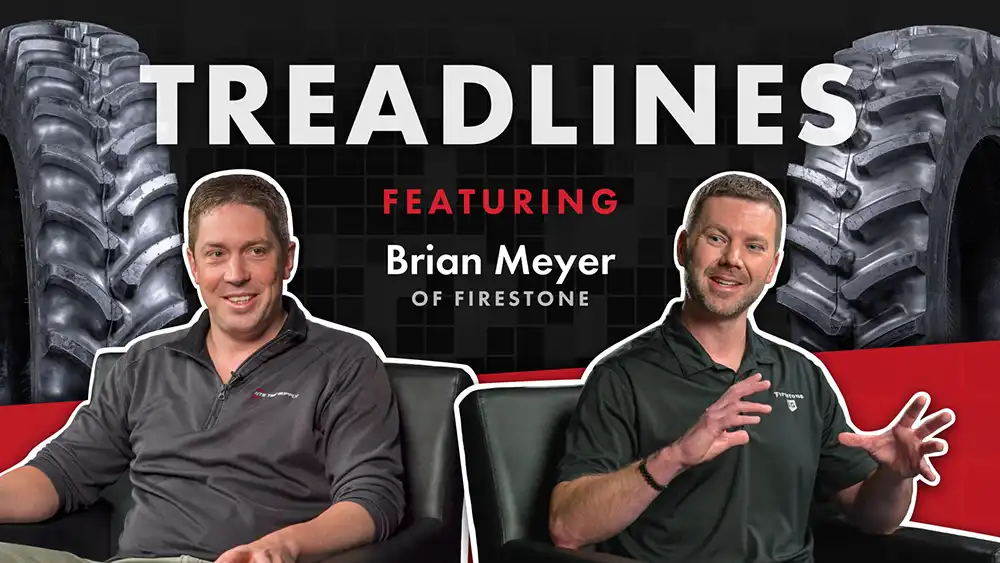When it comes to farm tires, Titan and Goodyear are two of the most recognized names in the industry. But how do they stack up when it comes to performance, value, and innovation? Good question. To answer it, we’ve combined our real-world insights into Titan and Goodyear’s tire lineup with a few product and corporate insights from Scott Sloan, Titan/Goodyear’s global product and LSW manager.

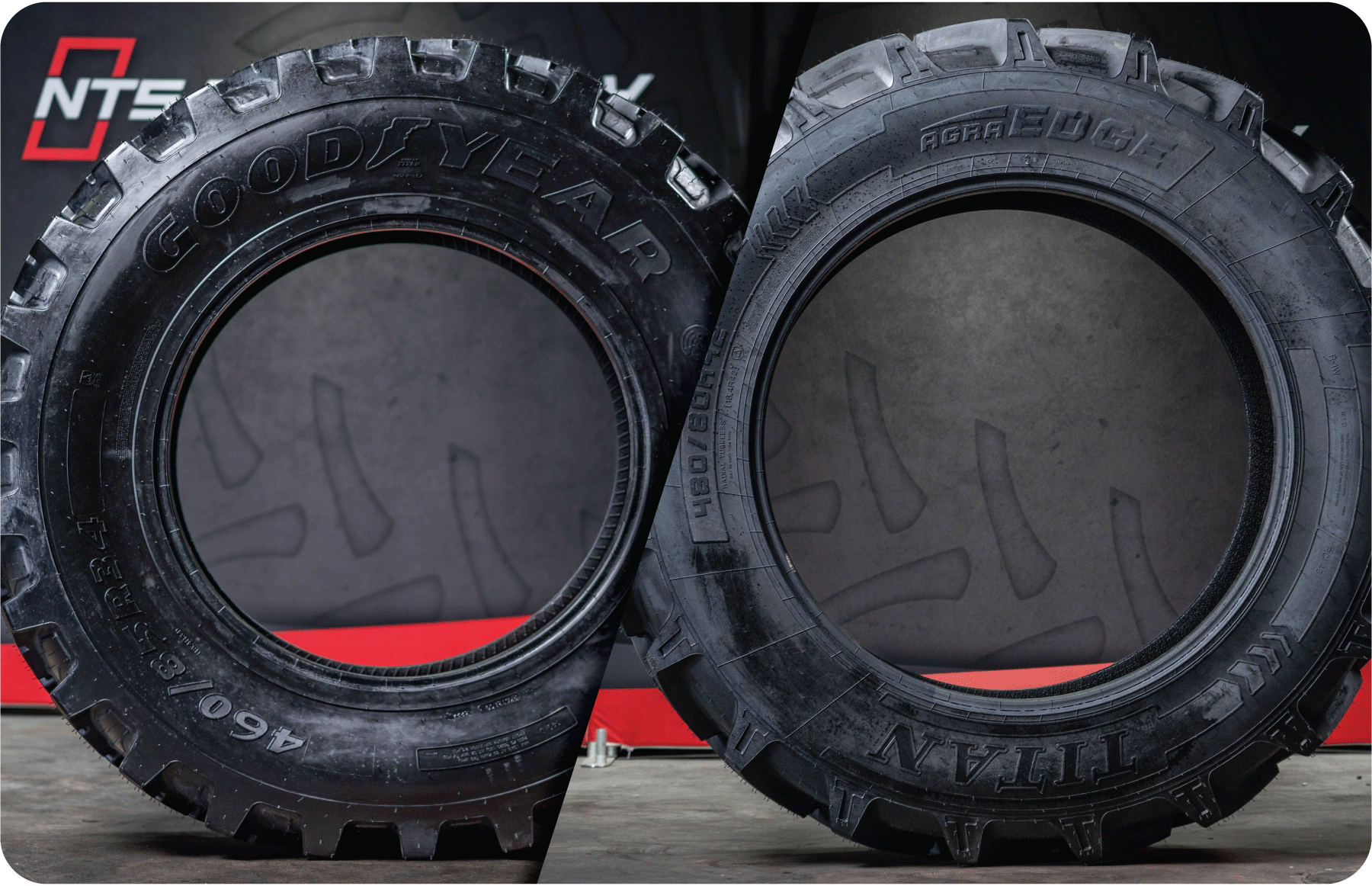
One Company, Two Brands
Titan International acquired Goodyear’s North American farm tire business in 2005, bringing both brands under one roof. Titan produces everything from small utility tires to the world’s largest farm tire, the LSW1400/30R46. The company is also the world’s largest manufacturer of ag wheels.
All Titan and Goodyear ag tires are 100% made in the United States., from R&D to final assembly—a point of pride for the company and an important consideration for farmers who prefer to invest in American-made products.
From Price-Competitive to Premium
Nestled under Titan International’s tire umbrella, Titan and Goodyear represent two distinct product lines. Titan is positioned as the entry-level, budget-conscious brand. Goodyear serves as the company’s premium tier, designed for high-performance machines like combines, sprayers, and high-horsepower tractors.
That said, you’ll still find some budget-friendly tires in the Goodyear lineup—and we’ll help you sort through the options down below.
Titan’s Proprietary Low Sidewall (LSW) Technology
Before we dive into the tires themselves, we need to talk about three important letters—LSW. Low sidewall technology, or LSW for short, is a unique aspect of the Titan/Goodyear’s product line. No other tire company offers this technology.
Scott Sloan, Titan’s LSW product manager, explained it with this analogy: Think about how the tires on your pickup trucks have evolved over the years. At one time, it was common for a pickup to ride on 15-inch rims. For years, 17- and 18-inch rims were the norm. And now, you’re seeing more and more trucks with 20s as standard equipment, at least on the fancier models. The LSW represents the same idea for agricultural tires—tires that maintain the overall diameter of a tire setup but feature taller rims and shorter sidewalls. Titan’s definition of LSW is an approximate 20% reduction in sidewall height. For example, a standard 800/70R38 becomes an 800/55R46 in LSW form. Yet both tires are approximately 81 inches tall.
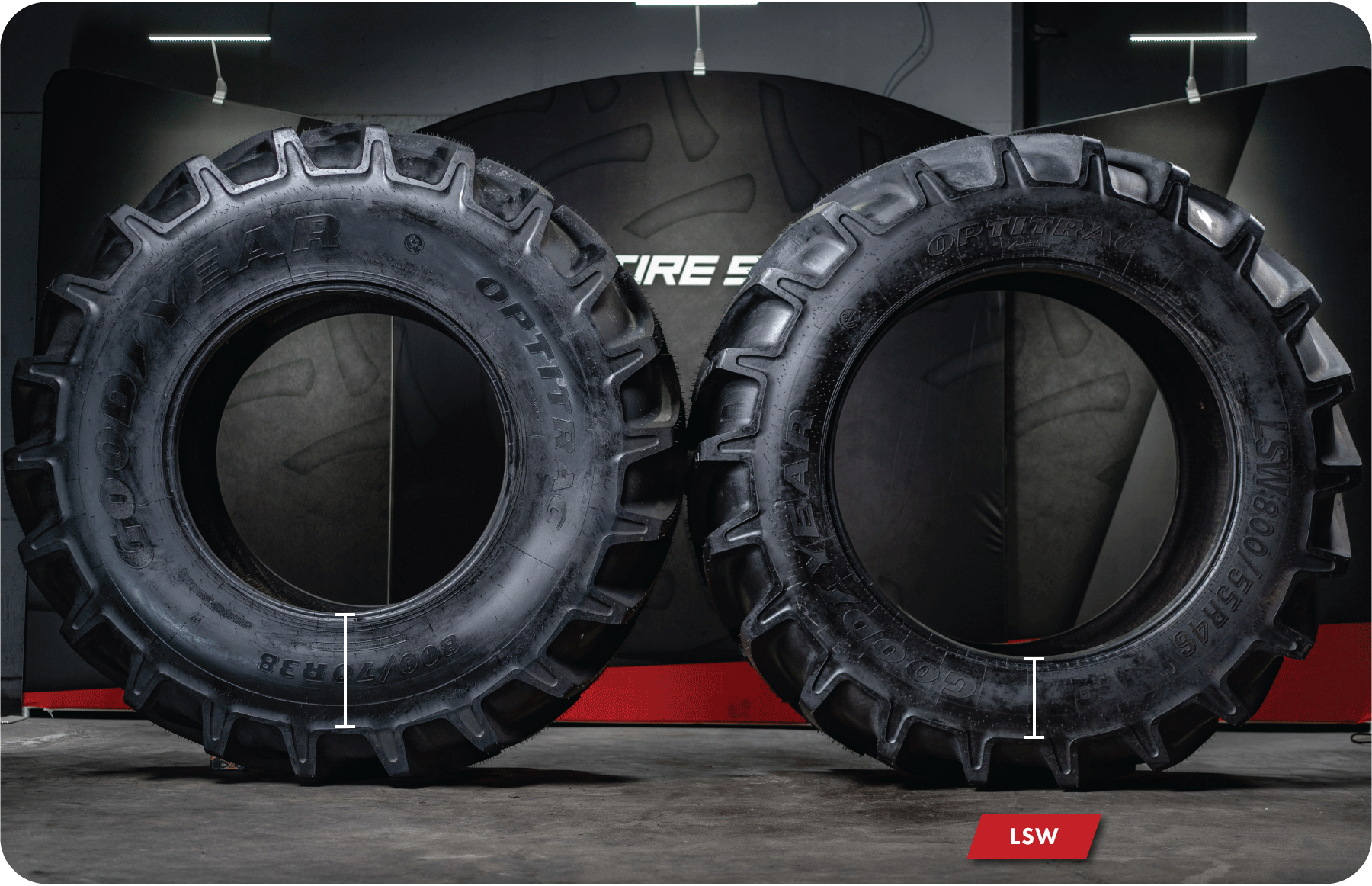
The company first began producing LSWs in 1998, with its first prototypes focused on skid steer and telehandler sizes. In 2004, the company produced its first “super single” prototype—the 1100/45R46. Super singles are tires that are intended to take the place of a traditional dual setup. At the time Titan introduced the 1100, it was truly revolutionary. In fact, the company had to modify tractors—cut fenders and such—just to make them fit. Eventually, the machines grew into the tires. In fact, in 2015 Titan/Goodyear introduced the LSW1400/30R46 which was, and still is, the world’s largest ag tire.
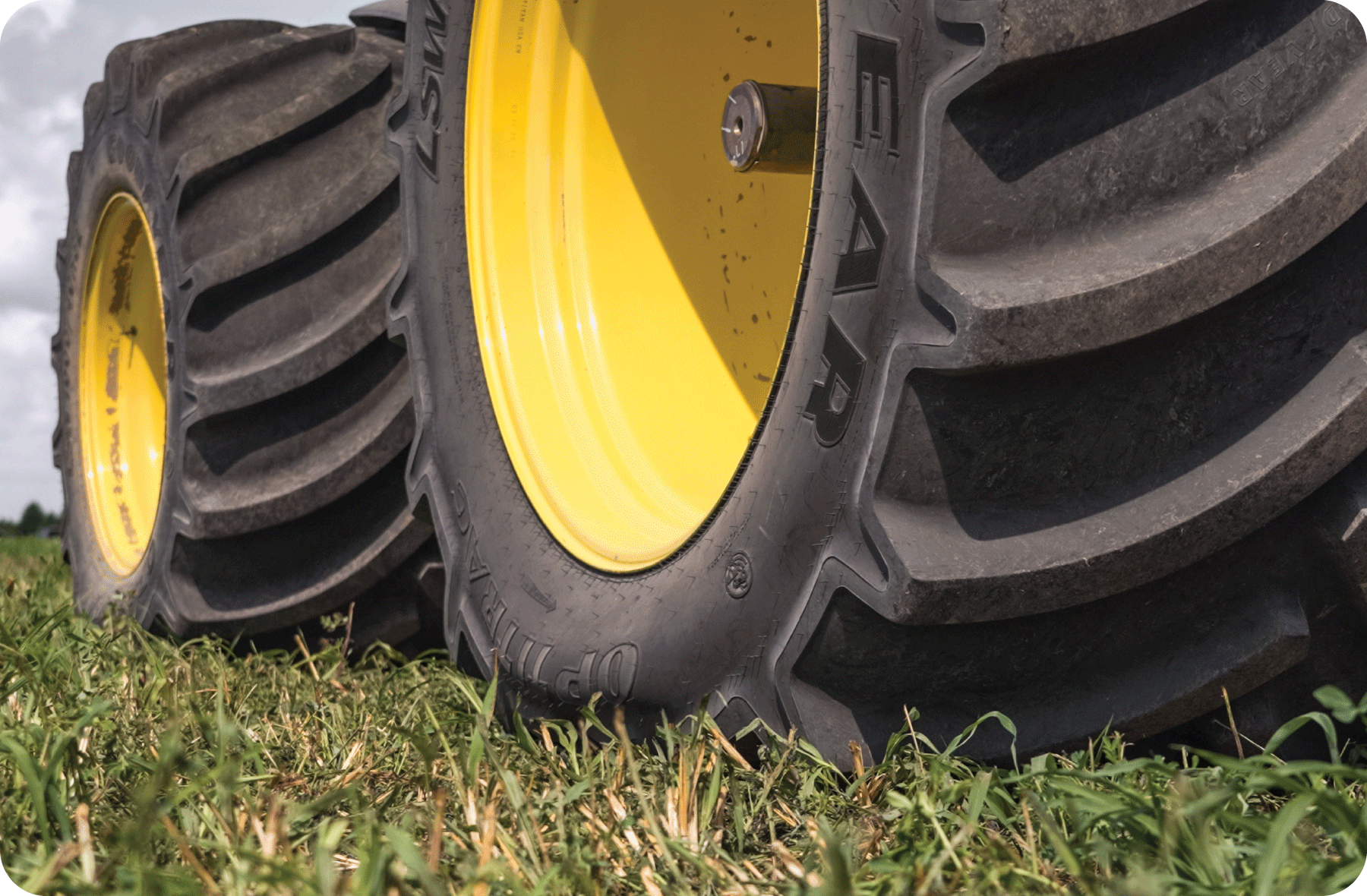
Our Experience with LSW Super Singles
At NTS, we’ve been selling LSWs since 2017. We have a ton of experience with these massive tires and have mounted them on everything from 4WD tractors to combines and even row-crop tractors used for planting.
In our experience, LSWs have been an effective tire setup to eliminate power hop and road lope. Their shorter, stiffer sidewalls result in a more stable rolling circumference, just like Titan promises. Some customers also appreciate the overall narrower machine width that is possible with an LSW super single setup. As an example, one combine we switched from 800/70R38 duals to LSW1250/35R46 super singles decreased in width from about 250 inches to 185 inches, which is a decrease of over 5 feet.
They bring other benefits too: For one, there’s no mud to plug between duals. And in the combine application, LSWs almost never have problems with cracking wheels. In this sense alone, they’re a major improvement over factory dual setups. If you still want to roll with a dual tire setup on your combine but are tired of dealing with cracking wheels, we manufacture HD straddle duals at our wheel facility in Olivia, Minnesota. We designed these ultra-tough wheels specifically for class 9 and larger combines and the toughest conditions fall has to offer.
Read More: Increase your Harvest Uptime with HD Straddle Duals
When the priority is putting maximum power to the ground with your high-horse four wheel drive tractor, we prefer wide dual setups over super singles. For example, we’ve outfitted several tractors with LSW900/50R46 duals, which will give you the largest footprint in the business and maximum traction for high-speed tillage. But you have to balance your traction needs with width, because a 900 dual setup on a four wheel drive tractor is going to put every mailbox in the county in danger.
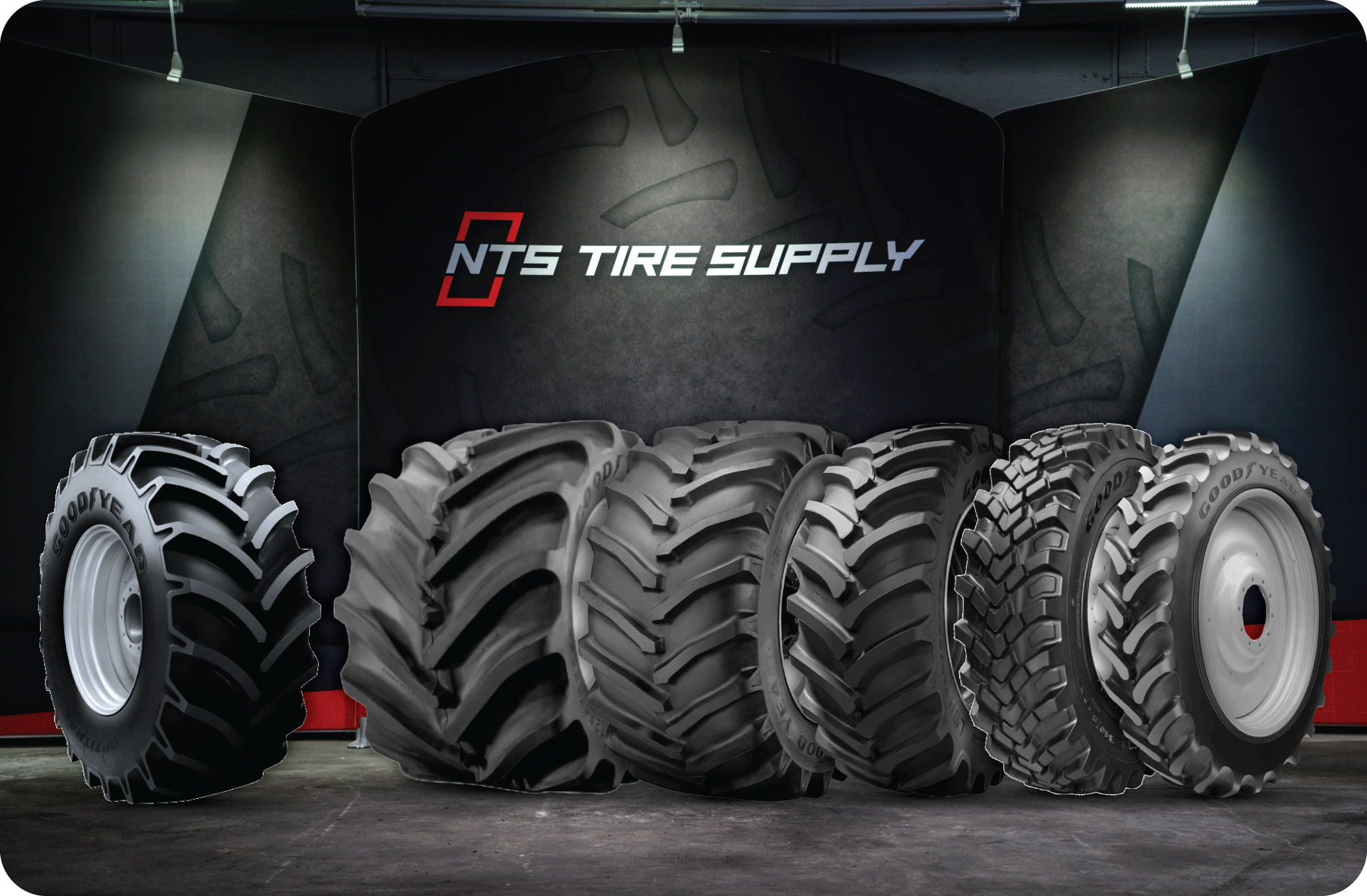
The Goodyear Farm Tire Product Line
Titan/Goodyear’s premium tires, intended to compete with Firestone and other tier-1 brands, are sold under the Goodyear brand. Before we list out individual tires, it’s important to note that Goodyear’s product line is organized by tire design. Within one tire line, you’ll find a wide variety of tire sizes, including IF, VF, and LSW options.
Goodyear Optitrac: From Skinnies to the World’s Largest Farm Tire
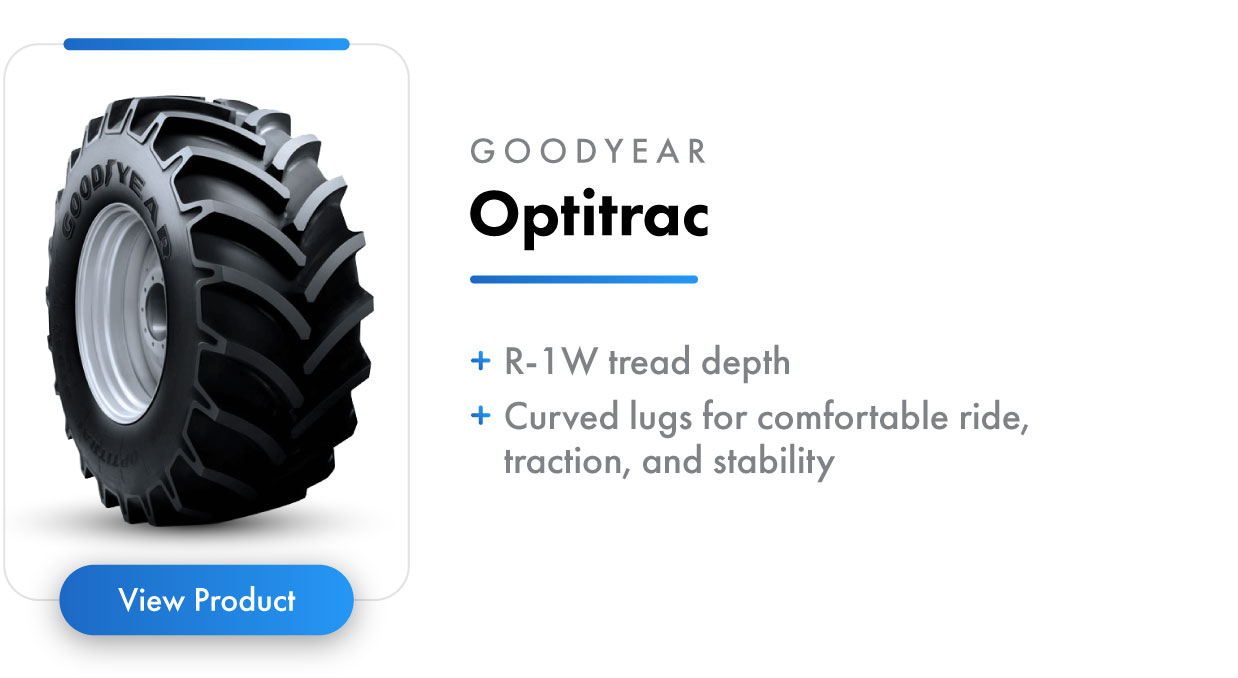
The Optirrac is available in sizes ranging from a 260/70R16 up to the world’s largest ag tire—an LSW1400/30R46. It’s mounted on everything from tractors to sprayers, combines, and grain carts. This is Goodyear’s premium R-1W tread depth tire, molded from Titan’s latest and greatest rubber compounds, with continuously curved lugs designed to offer both comfort on the road and maximum traction in the field. Whether in LSW, IF, VF, or standard radial form, the Optitrac is designed for a farm’s heaviest duty operations. Because it’s such a wide-ranging tire model, the Optitrac has a long list of competitors. Closest in overall performance is probably Alliance’s Agri Star II, which holds a slight price advantage over the Optitrac. The Optitrac also competes well against tires from the Trelleborg and Mitas lines.
Goodyear Optitorque: From Sprayer Float to Scraper Tire
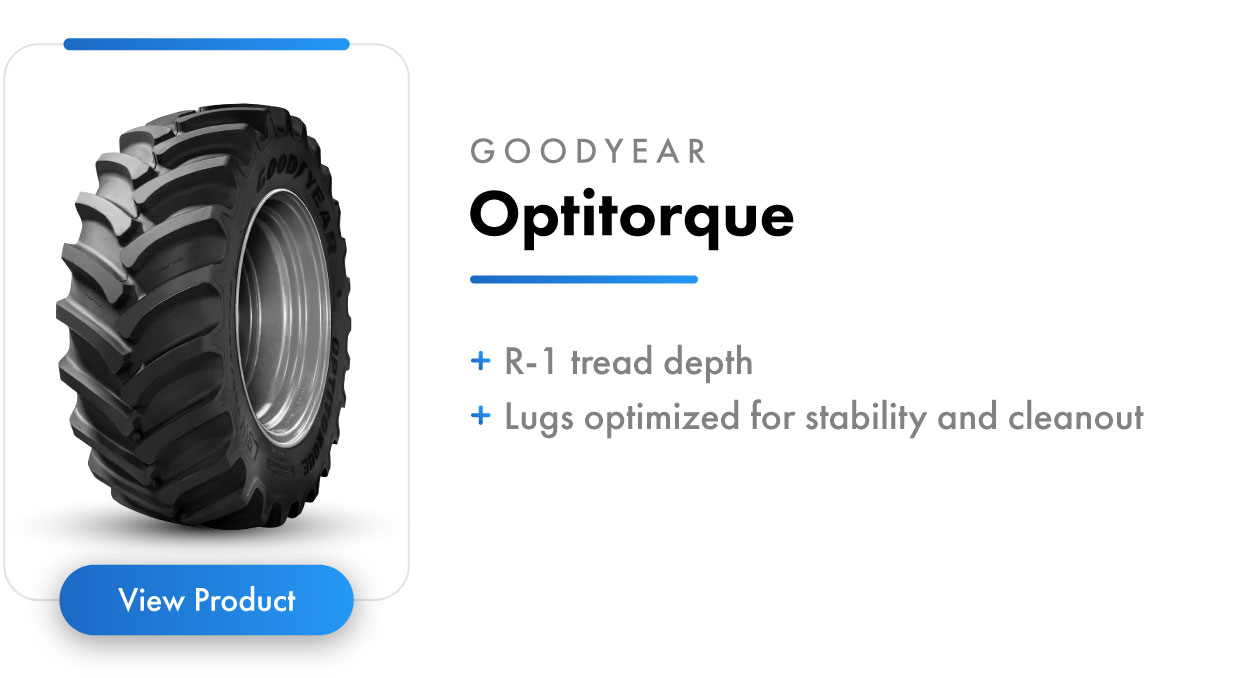
Scott Sloan from Titan told us that Titan originally designed the Optitorque for the sprayer float market. Today, it’s Goodyear’s premium R-1 tread depth tire. Its catalog of sizes isn’t quite as thick as the Optitrac’s, but the Optitorque still covers everything from row-crop to large floater sizes, with both VF and LSW options included. The Optitorque is mounted on sprayers, tractors, harvesters, and grain carts. The tire has a wide, short lug design with a larger nose for roading. The tire’s shoulders are rounded to be easier on the soil, especially when turning on the headlands. According to Scott Sloan, the Optitorque is also a popular scraper tire because of its lug design. The tire stands up to tough pulling on hardpan without its lugs tearing off, which can be a concern with R-1W depth tires. As far as the competition goes, the Mitas HC1000 and BKT’s Spargo offer similar performance to the Optitorque and they’re all within the same ballpark when it comes to price.
Goodyear Ultra Sprayer: A Long-Time Market Standard
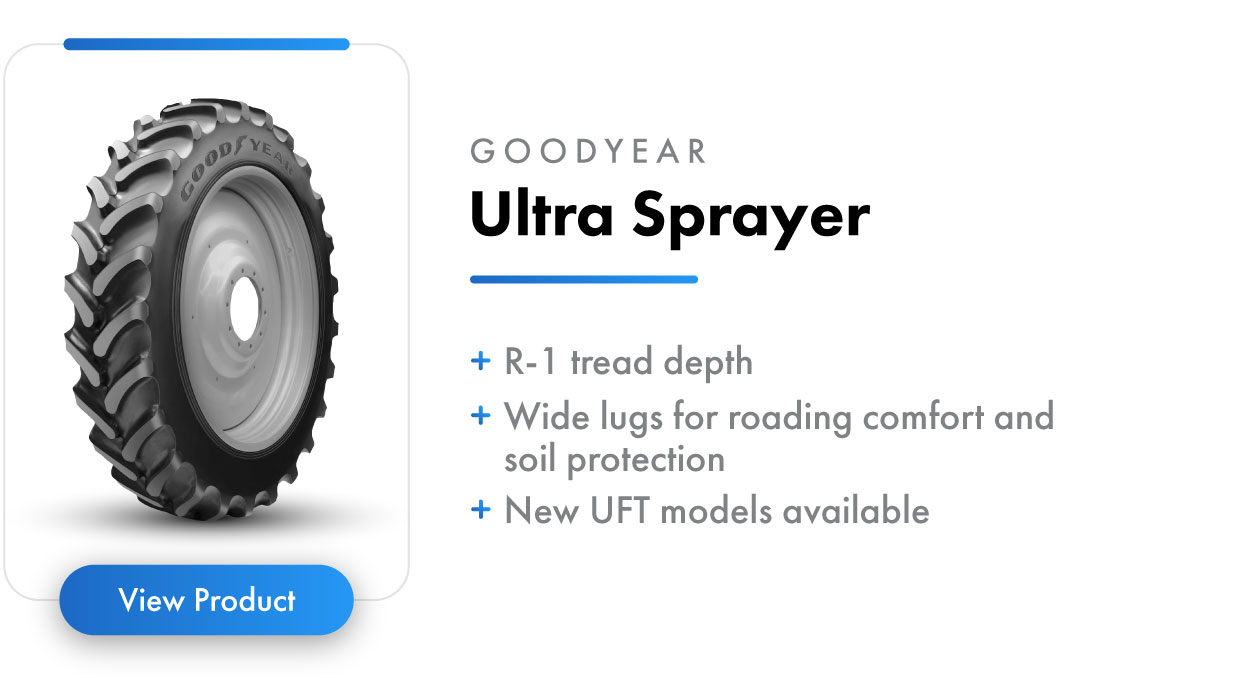
The Ultra Sprayer has been a mainstay in the sprayer tire market since its introduction in 2004. Its compound blend leans heavier on natural rubber, which is cooler running for all the road miles sprayers are expected to travel. It features an R-1 tread depth and a wider lug design with a larger nose for roading comfort and soil protection in the field. The Ultra Sprayer is also used in tractor applications, especially among row-crop vegetable growers.
Titan has also added what it calls Ultimate Flex Technology (or UFT for short) to its Ultra Sprayer line. Basically, UFT tires are able to serve as a replacement tire for either a standard, IF, or VF radial tire. UFT tires are able to perform at the higher tire pressures that standard radials tires run at, or you can mount them as part of an IF or VF tire setup and run them at lower pressures.
We consider the Ultra Sprayer to solidly mid-pack in the sprayer tire game. It’s comparable to a BKT Spargo, Trelleborg TM150, and the Mitas HC1000. A couple of our favorite options in this category are Alliance’s Agriflex+ 354 and Michelin’s SprayBib.
Custom Flo Grip: When Wet Conditions Come Calling
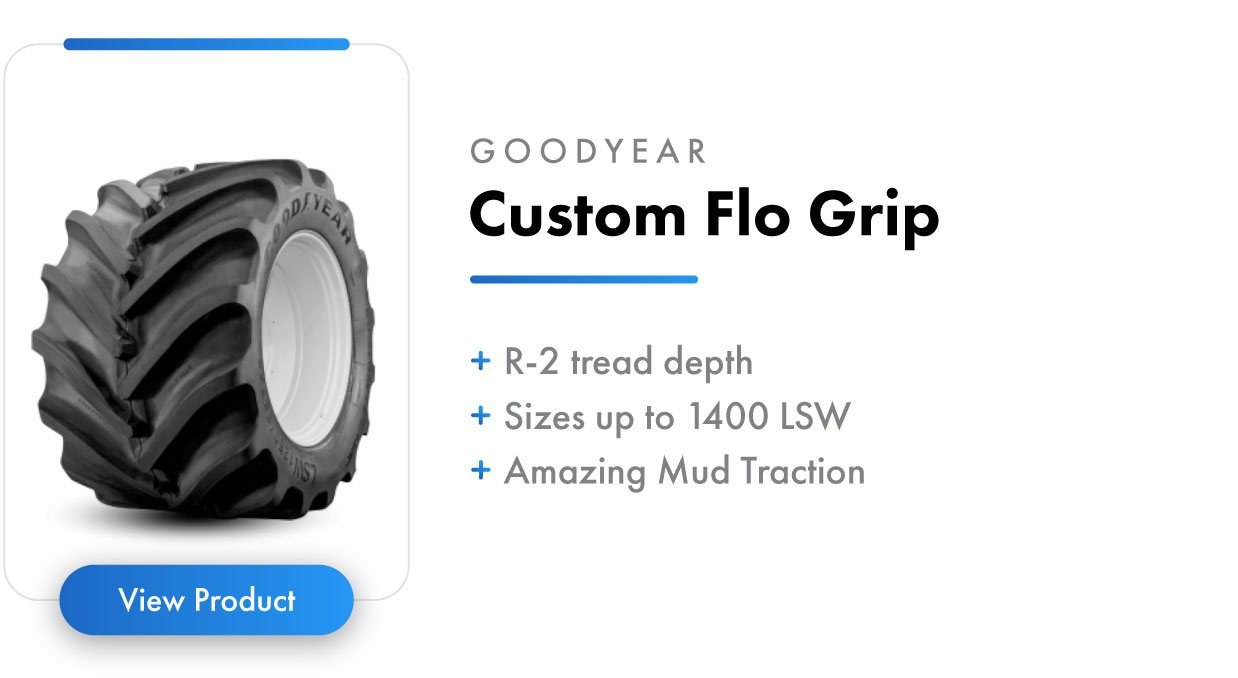
The Custom Flo Grip is an R-2 tire that’s engineered for mud performance. (Technically it’s an HF-4 tread, according to Scott Sloan from Titan/Goodyear.) It’s mostly available in wide LSW sizes and is a popular tire for combines and other harvesters that have to work in muddy conditions. While it’s optimized for traction and cleanout in the muck, it’s not a bad roading tire either.
DT930: One Size Fits All
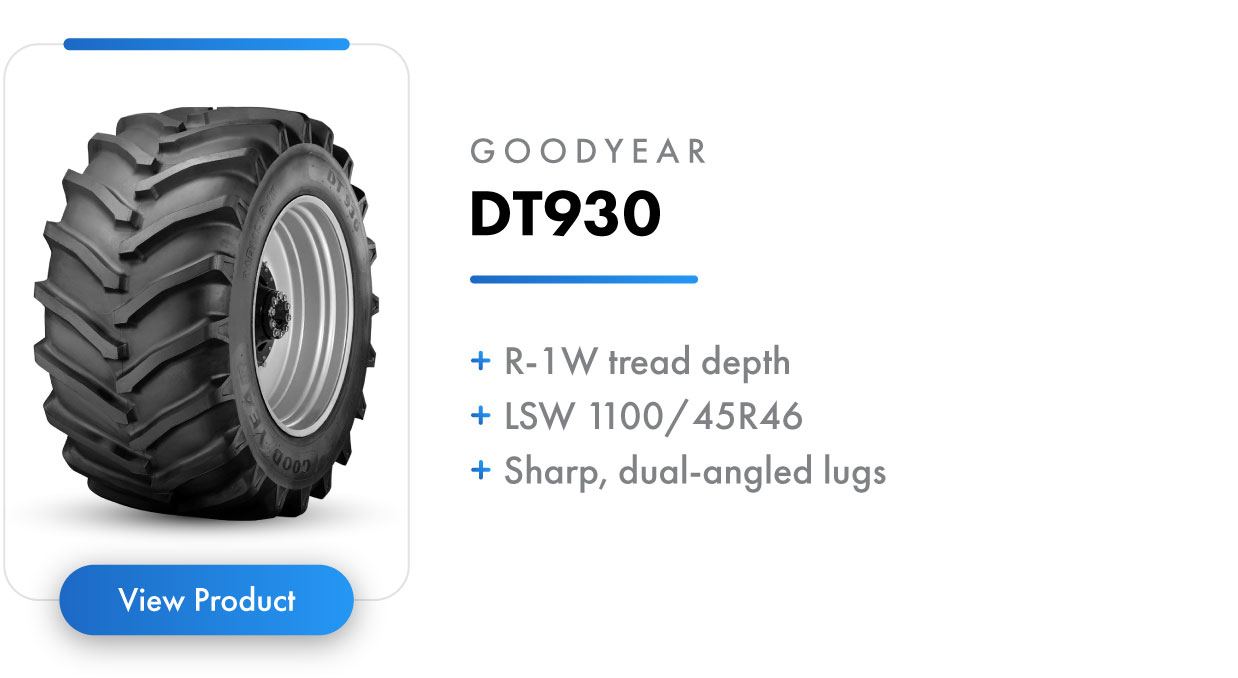
The DT930 is only available in one size—an LSW 1100/45R46. You’ll also find this size in the Optitrac line, but the two tires are a bit different. The DT930 is slightly cheaper, for one. And the DT930 has sharper dual-angled lugs, based on Titan’s old AG48M design. The Optitrac, on the other hand, has lugs that are one continuous arc. The DT930 is worth a look if you want to get into LSW super singles at a slightly lower price point.
R14T: A Rubber Chameleon
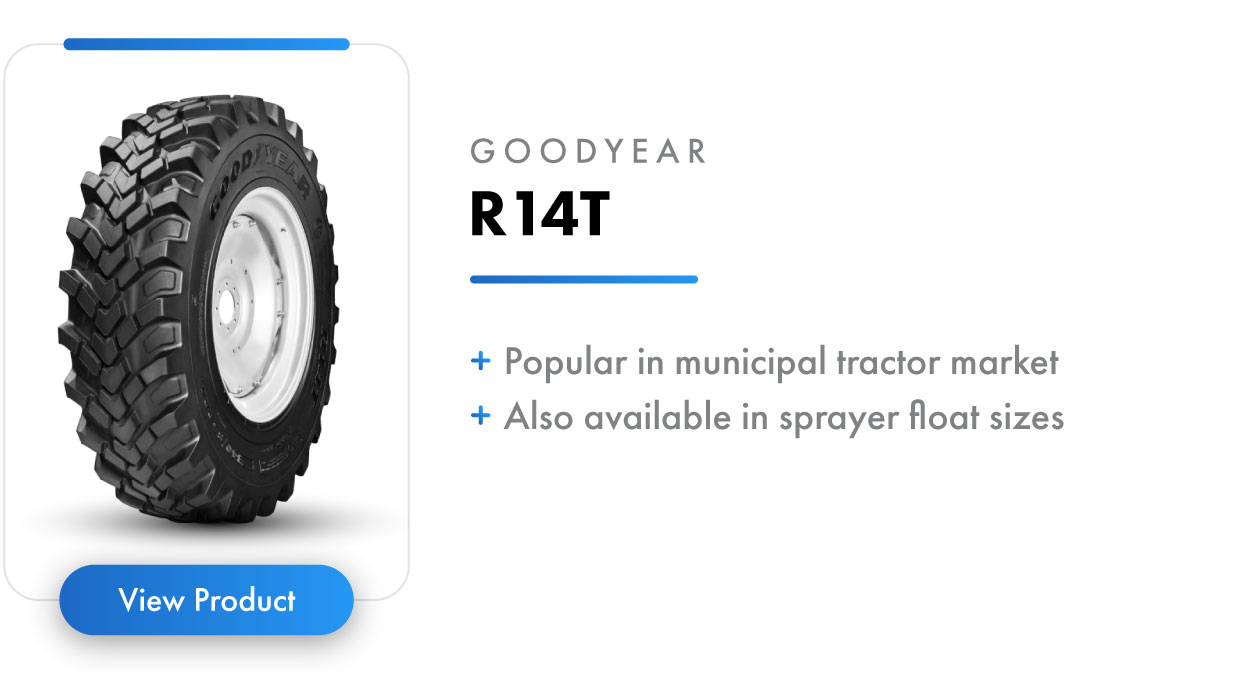
Titan calls the Goodyear R14T its “crossover tire.” The company created the R14T for the compact tractor market to meet the needs of both municipal customers and homesteaders doing light chores on the ranch. Municipal tractor operators are faced with a difficult choice—should we mount tires with ag, industrial, or turf tread? Because these tractors have many different jobs to do, it can be hard to find the right answer. The R14T is designed to run in all three scenarios—across fields, hard surfaces, and turf.
The tire’s segmented lugs use the Optitrac’s continuous-arc lug angle with a beefy center lug element borrowed from Goodyear’s MXL loader tire. The R14T is not just for compact tractors; Titan also offers the tire in sprayer float sizes. According to Scott Sloan, the tire is a good fit for sprayers because of the tire’s many lateral biting edges, which prevents sliding on hillsides. The company is also working row crop sizes into the R14T line as well.
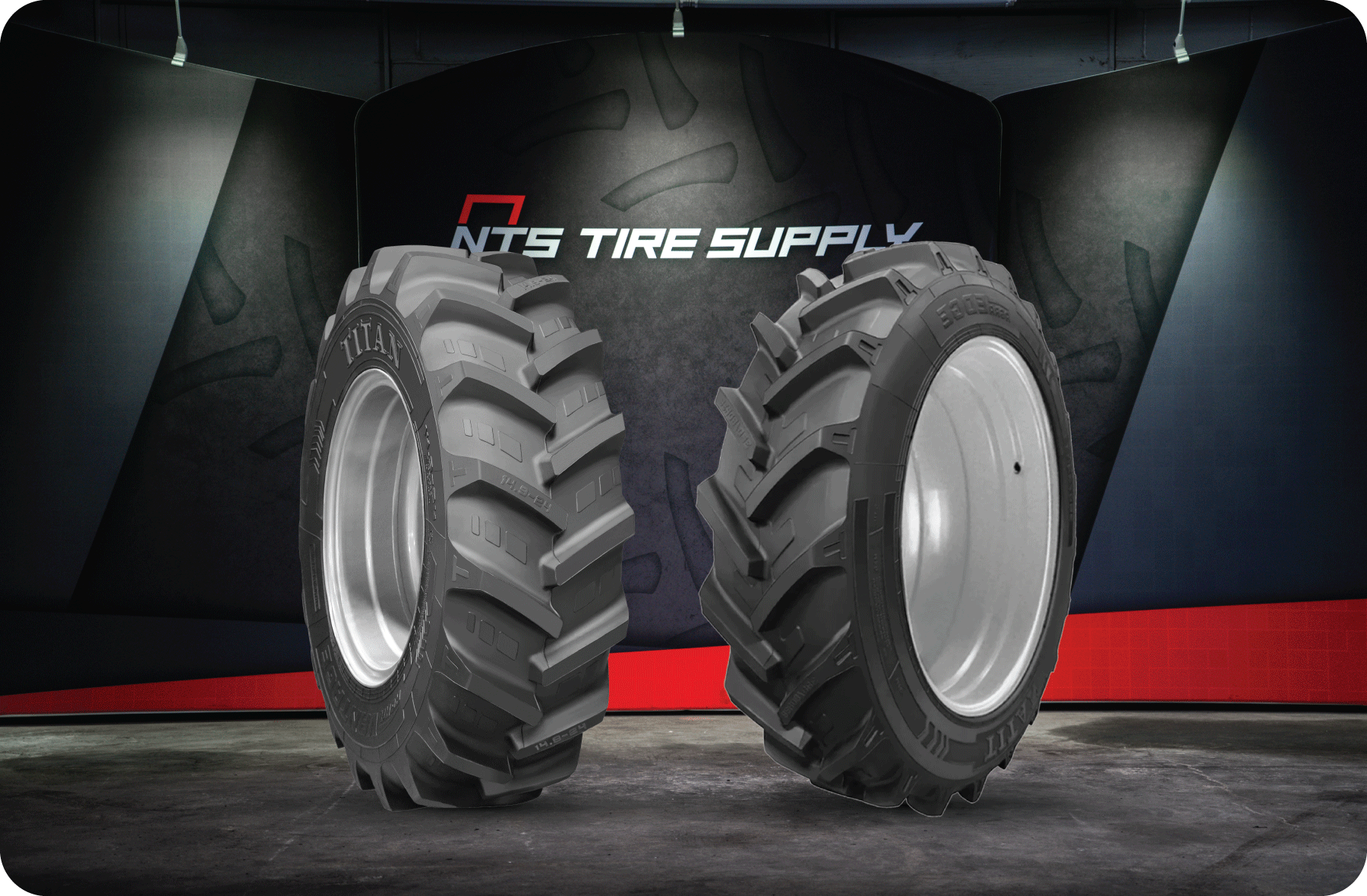
The Titan Farm Tire Product Line
If Goodyear is the brand destined to duke it out with the industry’s top tier tires, Titan’s bites are engineered to compete with other price-competitive brands. Before Titan bought the Goodyear brand, the company had been buying up farm tire product lines from other companies. At one point, Titan’s line was a hodgepodge of old product lines from Trelleborg, Pirelli, and General Tire to name a few. About 3 to 4 years ago, the company began the process of slimming down its product line and condensing multiple tire lines into one.
Titan AgraEDGE: A Basic Radial for Secondary Tractors
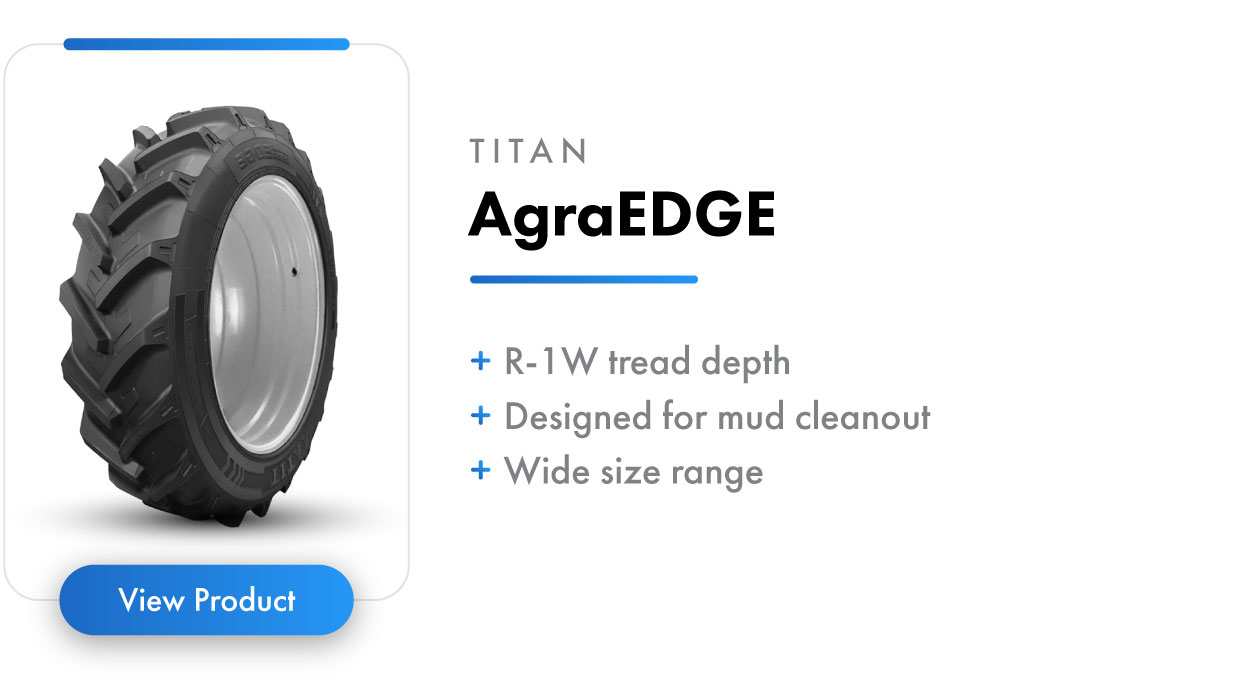
The AgraEDGE is Titan’s primary radial tire. For its creation, Titan’s R&D team started from scratch, giving it a 45-degree lug pattern designed for traction and cleanout. The voids between the R-1W lugs feature raised bumps designed to help eject mud and debris from the tire. The AgraEDGE initially launched with 27 sizes and was the first tire designed, developed, and released completely in the Titan world. Much like Goodyear’s Optitrac, the AgraEDGE line encompasses everything from skinny tires up to 800s.
In Scott Sloan’s words, the AgraEDGE was engineered to go up against the industry’s BAM products: BKT, Alliance, and Mitas. We’ve found the AgraEdge to be a perfectly good tire for chore or lower-hour tractors. In fact, its performance is right in line with Alliance’s Farm Pro II, another popular basic radial tire.
Titan AgraVantage
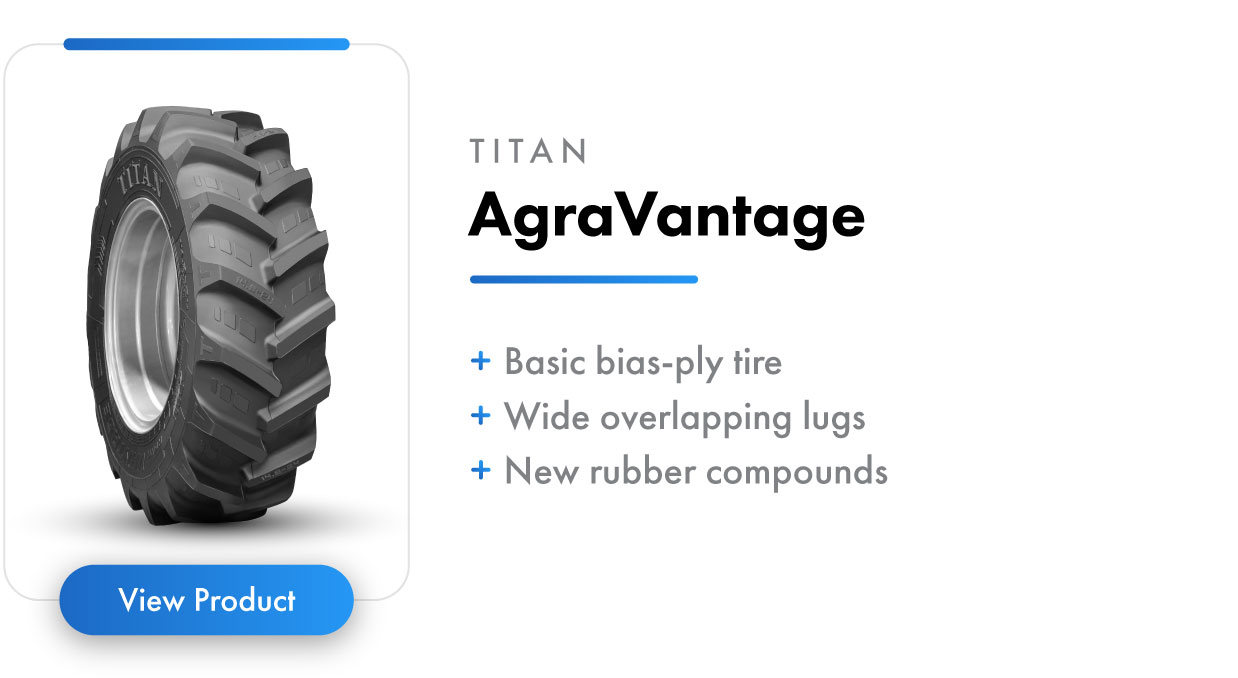
If you’re in the market for basic bias tires to mount on a chore or antique tractor, you may want to set your sights on Titan’s AgraVantage. As with the AgraEDGE, the AgraVantage replaces several older Titan tire designs that the company scooped up from various competitors over the years. (The tire’s so new that we didn’t have any in stock at the time we penned this article.) Design wise, the tire features updated rubber compounds as well as a tread shape passed down from the AgraEDGE’s development.
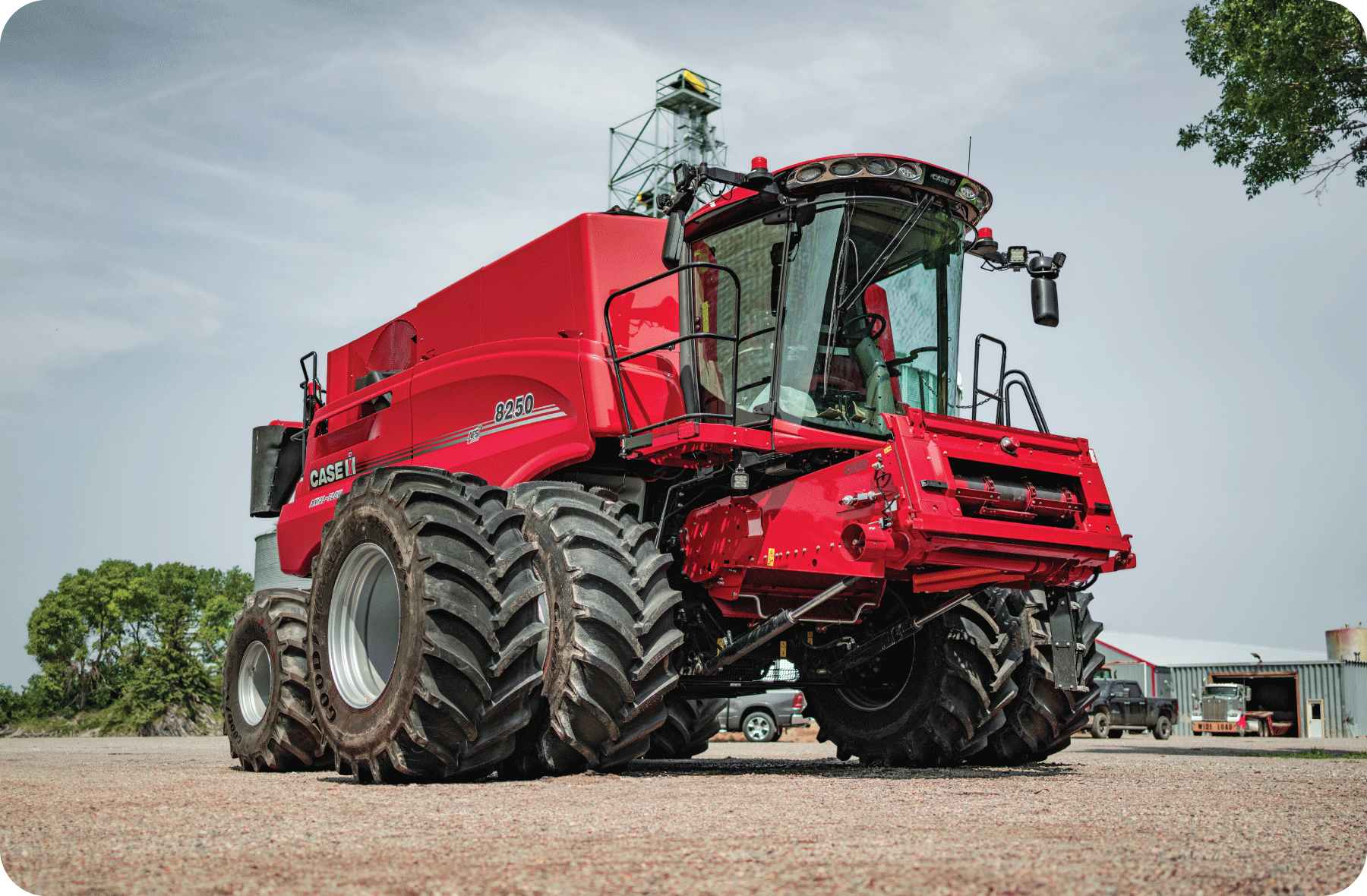
Titan/Goodyear Farm Tires Warranty Support
What happens if you have an issue with a Titan or Goodyear farm tire? In our experience, Titan/Goodyear has fantastic customer service and warranty support. Warranty claims have become more and more difficult over the past several years in the ag tire industry. With some brands, you’d have better luck buying a lottery ticket than submitting a warranty claim. However, Titan/Goodyear has always been very accommodating with warranty issues.
Here’s a quick summary of Titan/Goodyear’s farm tire warranty:
Goodyear Farm Tire Warranty
- Radials: 10-year warranty; free replacement in first 2 years if under 25% worn.
- Bias: 6-year warranty; free replacement in year 1 if under 10% worn.
- Stubble warranty: 3 years (radial), 2 years (bias) on select models.
- Field hazard: 2 years (radial), 1 year (bias), prorated.
Titan Farm Tire Warranty
- Radials: 8-year warranty; free replacement in first 2 years if under 25% worn.
- Bias: 4-year warranty; free replacement in year 1 if under 10% worn.
- Stubble warranty: 2 years (radial), 1 year (bias).
- Field hazard: 1 year (radial), 6 months (bias), prorated.
There are additional specifics for some warranty categories, but we’ll spare you the finest of fine print so you don’t nod off. Remember that NTS Tire Supply has an in-house warranty department that can handle all your ag tire warranty claims. We’ve even processed warranty claims for farmers who have bought their tires somewhere else. Save yourself a headache and let our warranty department handle your claim!
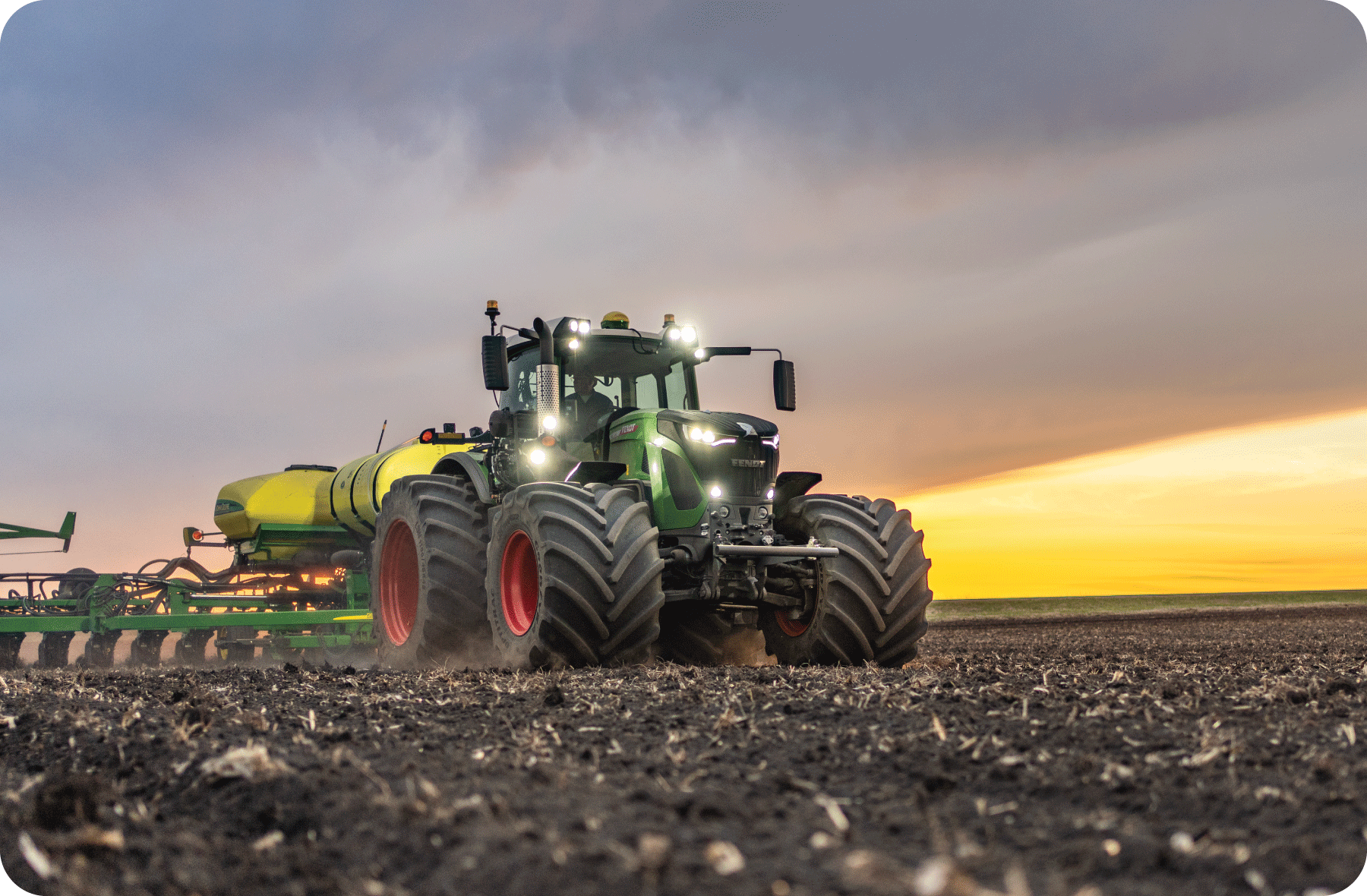
Final Verdict: How Do Goodyear and Titan Farm Tires Rank?
Let’s take Titan first: Titan bills its agricultural tires as basic, entry-level tires, and that’s a pretty accurate description. The market is pretty crowded at this price point and, when talking about tires meant for chore tractors and other secondary machines on the farm, there’s not much more to say. Your final tire choice in this price range will probably come down to availability and price.
On the Goodyear side, we’re definitely fans of the ultra-wide LSW super singles on combines, 4WD tractors, and even row crop tractors. Whether this type of setup is right for your farming operation depends on many factors. If you want help weighing the pros and cons of moving to a super-single setup on one of your machines, our tire experts are available to guide you based on nearly a decade of experience with these tires.
Read More: Planting into the Track of Goodyear LSWs
Overall, Goodyear’s tire designs have been around for a while. Many of the brand’s current products, such as the Optitrac, incorporate tread bar designs and other details from older product lines. However, in our experience, Goodyear farm tires compare favorably to other brands on the market at competitive prices. In fact, we’d stick Goodyear right in the middle of the farm tire pack along with Mitas, BKT, and some of Alliance’s portfolio. Goodyear is proof that you can stick with an older design that’s been proven over and over and be completely satisfied.
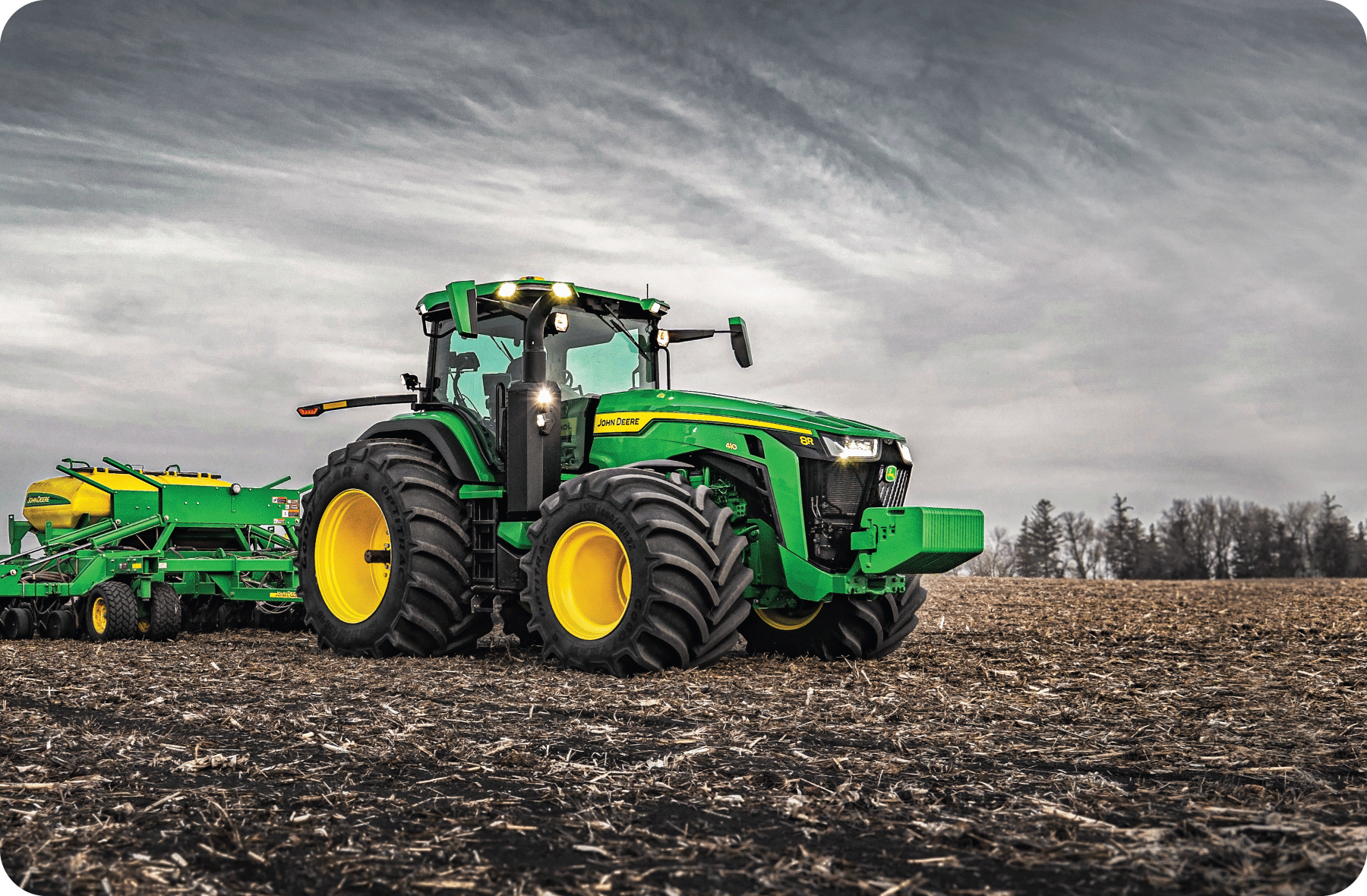
Is “Good For a Year” an Accurate Dig Against Goodyear?
You’ve probably heard the phrase “Good for a Year” tossed around. Do Goodyear tires really give out faster than other brands? We decided to do a little deep dive into our warranty data to find an answer.
As far as reliability is concerned, a quick glance at the data appeared to show that the Goodyear brand runs a bit higher in warranty claims than some other brands. However, after we took a closer look at the numbers, the story changed a bit:
- Many of the claims we’ve submitted have been for LSWs. Some of these claims were the direct result of underinflation. Remember that you have to set your tire pressures for the load and speed at which you’ll be operating them. Titan/Goodyear does a fantastic job of breaking down tire pressures by speed and weight in its databook. If you have questions about the right tire pressure for the job at hand, give our tire experts a call or consult the company’s databook.
- A second reason LSW claims seem higher than the industry average here at NTS is because we’ve had farmers contact us for warranty support who didn’t buy the tires from us. We jumped on LSWs when they arrived in the market and have advertised them far and wide. So, naturally, farmers see our ads and call us for warranty assistance and to find a replacement tire, which makes it look like we have a higher percentage of warranty claims for LSWs on the books.
In short, by our calculations, Goodyear warranty claims run about the same rate as other brands. So, the “Good for a Year” nickname doesn’t necessarily fit. Just remember to follow the company’s databook guidelines for inflation pressures and maximum loads, as you should with any brand. As we mentioned above, if you do have an issue with a Titan/Goodyear tire, you’re in good hands, as the company is fantastic about standing behind its products.
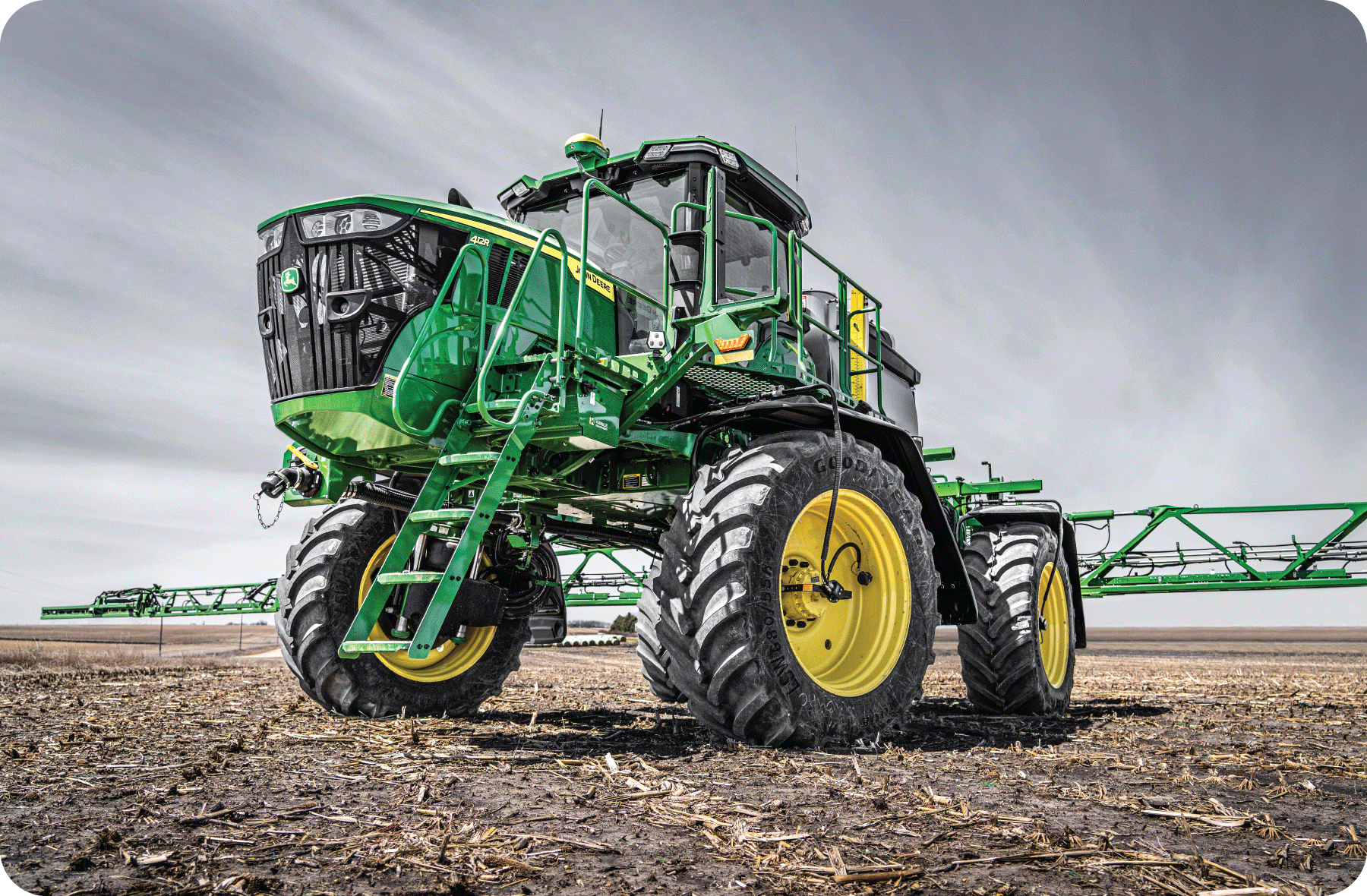
Get the Right Tire System™ for Your Farm
Should you shop Titan or Goodyear or look at other tire brands for your next purchase? The easiest and fastest way to find the tires that are the best fit for your farm’s needs and budget is to call and talk to one of the ag tire experts at NTS Tire Supply. We sell all brands of agricultural tires and will recommend the Right Tire System™ for your unique needs. We’re here to Drive Your Farm Forward!

.png)
.jpg)




